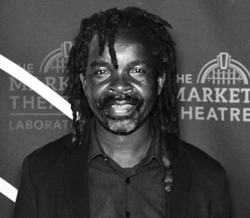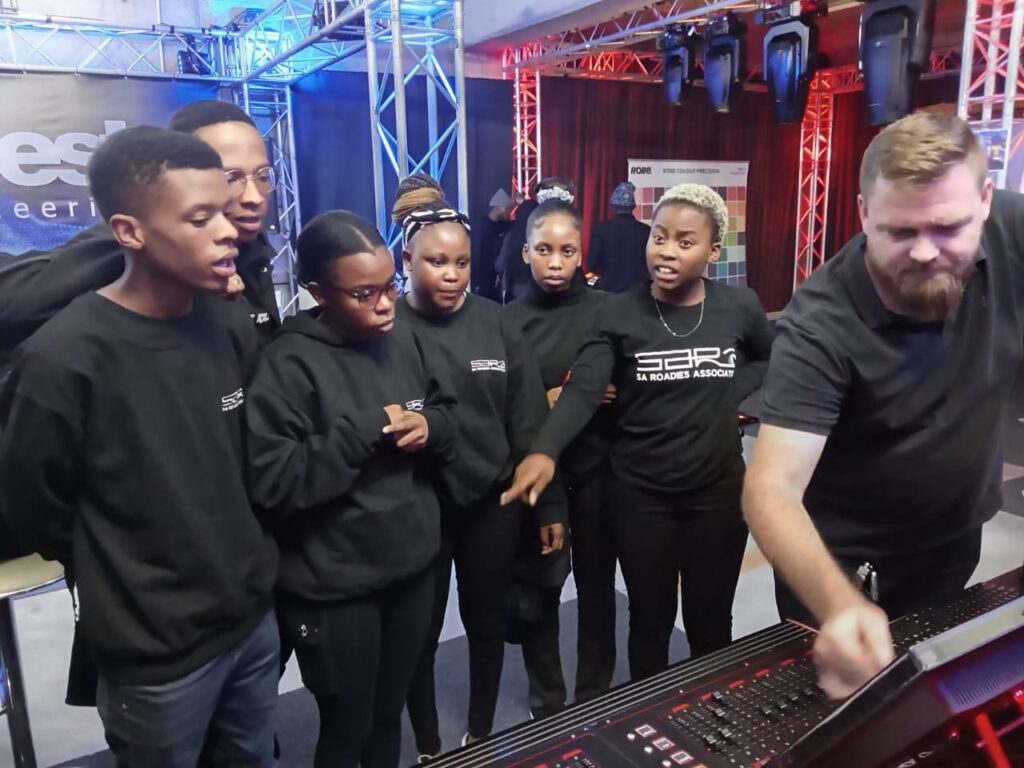Gayton Mckenzie, hailed by some, but may have missed a low hanging fruit-expediting the establishment of Backstage Academy South Africa
By Edward Tsumele, CITYLIFE/ARTS Editor

The creative and cultural industry, for the longest of time was weighed down by a plethora of problems. These ranged from corruption allegations levelled by creatives against officials of the Department of Sport, Arts and Culture, (DSAC) the appointment of successive Ministers who many in the sector regarded as individuals who were there while bidding their time for what they considered senior appointments in other government cabinet positions other than the sector, as well as simply incompetence on the part of some officials in the department. This has been happening for a very good part of the past 30 years of freedom.
That is perhaps the reason why when a new Minister Gayton McKenzie was announced as the new Minister of Sport, Arts and Culture by President Cyril Ramaphosa after the general election in May 2024, whose outcome necessitated a Government of National Unity, there was a sigh of relief. Not so much because McKenzie had demonstrated exceptional leadership skills in a previous Cabinet position. This was his first Cabinet appointmentbut had been a mayor previously of the Karoo Municipality before. The excitement was because McKenzie in every respect was from outside the establishment.
That is, he did not come from the major political parties that are well established, such as the ANC, the DA, IFP or EFF, but a new party which contested national elections for the first time in May this year, the Patriotic Alliance. It scored a sizeable number and became part of the Government of National Unity. In addition, McKenzie also came into the Ministry with a certain energy that gave the sector some confidence.
For example, he is charismatic and confident outwardly, and those who are in the know also know that he has some literary streak running through his veins having published best seller books, mainly about his life as a convict and how he turned his life around as a successful-businessman-turned politician. The creative sector people, tired of politicians appointed to this most powerful position in the creative and cultural sector in the country in the past 30 years, who somehow did not turn the sector around for the longest of time, believed the new Minister was their man. They expected him to perform the magic that would fix the sector once and for all.
Appointed in July, McKenzie is therefore about six months in this position, and therefore granted, it becomes difficult to come in and weigh whether or not he has delivered as per expectations of the sector that for the longest of time had somehow lost hope that the Ministers appointed to this position would shake it for the better and deal with the teething issues that had been facing the sector for the longest of time. Such as those I have indicated above.

This has resulted in a situation whereby the sector is divided currently on the verdict about the performance of their new Minister. On one hand, there are those who believe that McKenzie will ultimately deliver the goods, after all he still has four and half years as Minister as per contract he signed with the president of the Republic (unless of course there is in between a cabinet reshuffle that would affect him). On the otherhand,there are those who already see red lights in the past six months that the Minister had been in this position.
Now this is where it gets tricky. The M&G newspaper, which every year during this time, rates Cabinet Ministers’ performance, in the last edition of the year has rated McKenzie’s performance at C+. And of course, because this exercise is not a water-tight, scientifically evaluated endeavour, there are most probably those who are saying he deserves a higher rating, and equally those who believe the paper was too generous. Therefore, as is always the case in such scenarios, the truth remains in between, and it is Okay.
Having said that perhaps in evaluating the new Minister’s performance, let us look at what we know about what the Minister has done and has not done as expected so far.
Let us start with what he has done and for which he was praised by some in the sector and those who want to see the sector come out of this quagmire it finds itself in currently.
When the minister was informed that one of the most illustrious schools in the country, the National School of the Arts in Braamfontein, was in financial distress, he zoomed in on it swiftly. After all this school which has produced actors, painters and musicians of substance, some of whom indeed went on to achieve spectacularly in their respective areas academically and professionally,deserved to be saved from the inevitable catastrophe.
In fact,the school was at a point where it faced the unthinkable prospect of collapse. That is before McKenzie quickly moved in and doused the fires. As a result of this timely intervention by the minister, the school is reportedly now out of its financial doldrums. That was quick and considerate on the part of the Minister as no one in their right mind would want to see such a school with so much history of delivery in the arts collapse.
The Minister has gone further to announce further support to the school in the form of a scholarship targeted towards benefitting of orphans of those who “passed on in line of duty for the country” such as policemen and women etc. Well, we can go on and debate about how he chose this category of beneficiaries for the 35 scholarships, but the point though is that somewhere a child who is an orphan will benefit from this generosity and empathy, and more importantly the National School of the Arts is getting more support from DSAC. When everything is said and done, that is what matters, giving our young people a shot at quality education irrespective of their financial background.
Also, soon as the Minister was appointed, he immediately had to face the elephant in the room in the form of a federation known as the Creative and Cultural Industry Federation of South Africa (CCIFSA).
Well, when this federation was formed with the financial assistance and in a way, the encouragement of DSAC, it was well meant as it was formed to represent the sector, which government found to be working in silos, particularly when it came to the sector’s interaction with government so that the sector could better be supported.
But under bad and crooked leadership, CCIFSA degenerated into a corrupt, moribund and useless federation which only served the interest of the salaried officials who raided the fiscus while DSAC officials reportedly turned a blind eye. The federation’sperformance was so pathetic that Annual General Meetings were not held, its books are in a chaotic state (this was revealed in Parliament where the Portfolio Committee on Sport, Arts and culture rejected its financial Report with some members of Parliament suggesting that a forensic investigation be instituted).And further claims were made that some officials were not properly elected to sit on the CCIFSA body. In fact, the relationship between CCIFSA and DSAC seemed to have been reduced to that of either patronage of a parasitic nature.
And therefore, McKenzie was hailed when he moved in to detach CCIFSA from DSAC, and currently CCIFSA’s continued hold on DSAC’s finances is precariously uncertain considering these new developments. But at the end McKenzie’s move in this regard was hailed by those who are not crooked within the sector as this was seen as an overdue action by the executive authority.
Also, as soon as McKenzie found himself at Sechaba Houseon Madiba Street’s top Floor in Pretoria, he correctly convened a bosberaad with the creative sector, out of which there was an agreement among the creatives that the sector needed to be reorganised. This ironically is in a way what CCIFSA was supposed to have done in the past 10 years instead of spending the R30 million handed to it and yet there is nothing on the ground to show what that money was used for.
Currently the sector under McKenzie’s and DSAC’ supervision is organising itself into subsectors, out of which, it is hoped that subsector councils will be elected, and it is these councils that will be able to design a new cultural and creative industry sector landscape in South Africa. Though there are reservations by some in the sector that these councils will not deliver the goods, especially because there in these subsector committees are rotten potatoes that risk contaminating the whole pot. Indeed, looking at some of the names that are there, one is bound to cringe as some of them are so tainted that having them there is mind boggling. Irrespective of these misgivings however, this attempt to recalibrate the creative and cultural sector is a good move and in the long term might work in improving the sector’s standing and efficacy. That is if these subsectors are led at the end by people with integrity in the sector instead of by compromised individuals positioning themselves to line their pockets. Once again.
Therefore, these three developments above that have been triggered by McKenzie’s appointment have emboldened those who believe that the new Minister will deliver the goods.
South African Roadies Association and Backstage AcademySouth Africa.
But there is something else cruciallyvital in the creative and cultural sector that the Minister has missed. A low hanging fruit actually, and that is fast-tracking the planned establishment of what promises to become an institution of excellence when it comes to the training of the youth in live events technical production skills. This is thefunding of the establishment of Backstage AcademySouth Africa by the South AfricanRoadies Association (SARA), a Non-Profit-Organisation based in Newtown.
Technical production crew are the people who are behind the scenes for every live event, be it a music festival, concert, conference, theatrical production, sports, working as sound technicians, stage managers, riggers, lighting, audio visual and so forth and so on. These are the people who make the magic to happen on stage in other words. Without these people, there is no show and that is not an exaggeration. Now, SARA for over 20 years has been training young people, a good number of whom are currently working all over the world, including here in South Africa and the African continent, in the US, Europe, on Cruise ships and the Middle East, to name but just a few. So far over 2000 youth have been trained and some of them own businesses of their own in the live events technical production sector in the country. SARA’s courses are currently accredited to NQF Level 4, and therefore a much sought after skills set in the live eventstechnical productionsector around the world.
Now SARA which for over 20 years has created partnerships and networks with major role players around the world, including trainers and institutions in live events technical production has sealed an important partnership with the world’s leading institution in live events technical production training, the UK’s Academy of Live Technology to collaborate in establishing Backstage Academy South Africa, which will see local youth, especially from formerlydisadvantaged backgrounds, such as townships and rural areas earning skills in the live events technical production sector, once this technical institution is established.
Once established the plans in place include the upgrading and registration of Live Events qualifications in South Africa from NQF Level 4 up to NQF Level 8 by SARA in collaboration with the. Academy of Live Technology (formerly Backstage Academy).
These qualifications at the core of which are Live Events Production, Live Visual Design and Production, Creative Technologies for Live Events, Immersive and Media Design, and Virtual Production, are so important that they are skills of the future in this fast-evolvingdigital world.
However, funded by DSAC, the establishment of the Backstage Academy South Africa has for unknown reasons stalled because DSAC has stopped releasing further funds amid claims it made in parliament that SARA did not properly account for money advanced for the projectso far. These are claims however that SARA has consistently vehemently argued arefabricated, as the organisation saysevery cent has been accounted for. SARA has therefore lodged a complaint to Parliament in what it claims are “dishonest and false statements” made by the Acting-Director-General Dr. Cynthia Khumalo as an excuse for delayingreleasing further funds that would enable expediting the establishment of this important institution.
Where is McKenzie in this petty blaming game?
It is here where the Minister must intervene over the petty issues and perhaps even pettier egos that seem to be at play here, but which have the potential of delaying the establishment of such an important institution in Africa. The first point of call that seems to be so obvious is for the Minister to summon the two parties to sit around the same table where their differences can easily be ironed out over a cup of coffee so that young people can benefit from such technology intense training and therefore earn a living and create employment opportunities with these skills of the future.
The establishment of such an Academy therefore should not be delayed by what appears to be petty bickering and inflated egos at play here, unfortunately at the expense ofexpediting the establishing the Backstage Academy South Africa on 55 Henry Nxumalo Street in Newtown.
In the meantime, it seems as if the differences between the Portfolio committee on Sport, Arts and Culture and DSAC senior officials on a number of issues that played themselves out in the past six months are bound to reoccur in the next year, judging by the acrimony that happened between the senior officials and the members of the Committee(see our report also in this edition of CITYLIFE/ARTS).Those issues of differences had not been ironed out before the holiday break, ushering in the new year.










